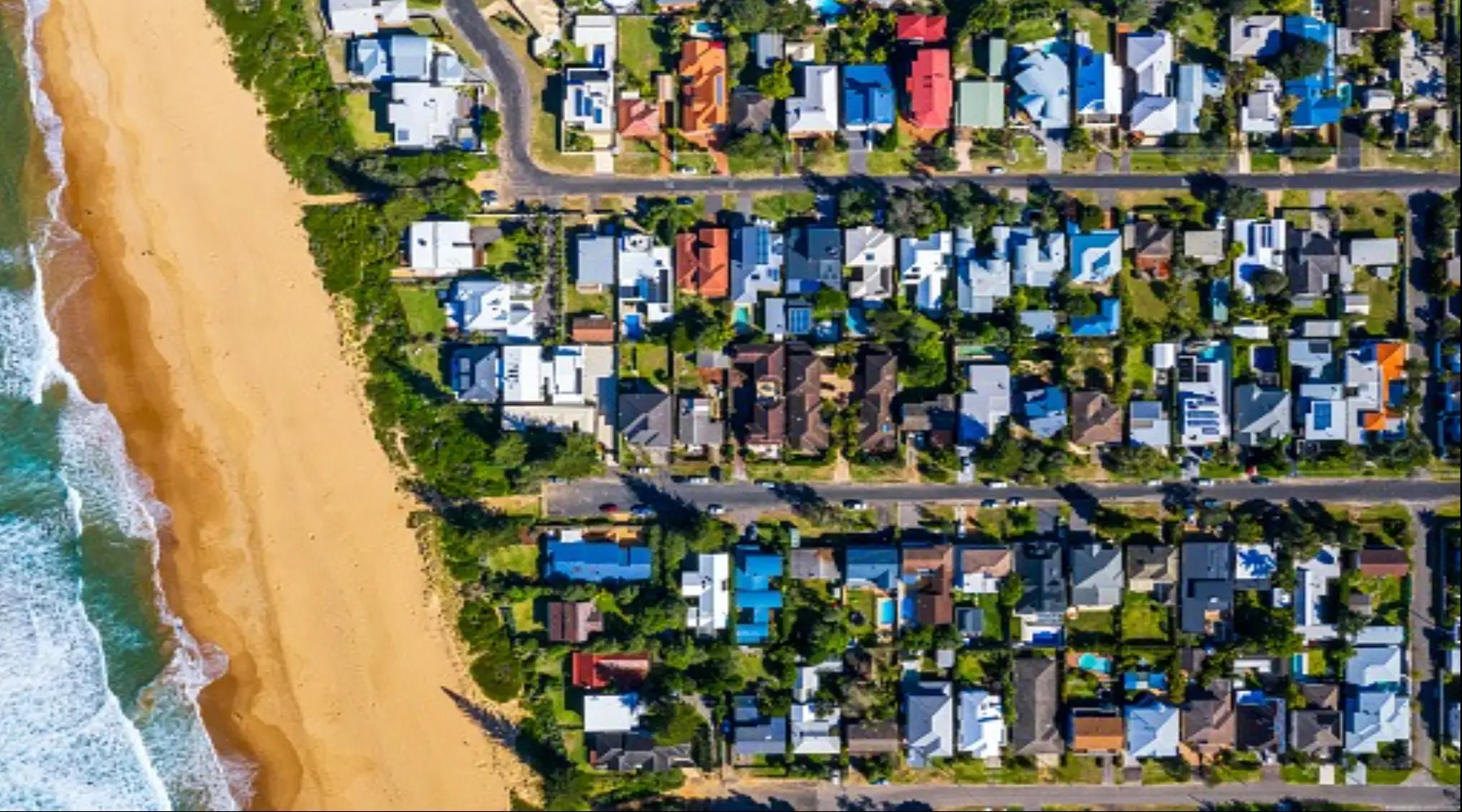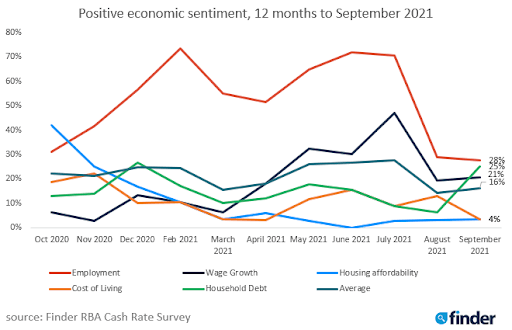RBA Survey: Experts predict $76,000 increase in property in next 12 months

House values will continue to rise next year despite the most recent spate of lockdowns, according to experts.
In this month's Finder RBA Cash Rate Survey™, 40 experts and economists weighed in on future cash rate moves and other issues relating to the state of the economy.
While all panellists correctly predicted a cash rate hold in September, the vast majority (86%, 25/29) of those who weighed in on property prices believe that the current wave of lockdowns has not burst the property bubble.
In fact, experts are predicting the property market to continue to run for the next 12 months, – especially in Melbourne, where a predicted 9% price increase would increase the average home price to $817,114.
The predicted 8% increase in Sydney would see property prices increase another $76,619 on average.
Graham Cooke, head of consumer research at Finder, said that lockdowns seem to have had little effect on house sales.
"The average Sydney homeowner earned more than the median family wage over the last 12 months in property equity alone, and it looks like they are set to repeat that over the next 12," Cooke said.
Predicted house price values in 12 months
| City | 30 June 2020 prices | Predicted increase | Price increase | Predicted price in July 2022 |
|---|---|---|---|---|
| Melbourne | $753,100 | 9% | $64,014 | $817,114 |
| Perth | $526,166 | 8% | $42,498 | $568,664 |
| Brisbane | $586,142 | 8% | $47,342 | $633,484 |
| Sydney | $994,298 | 8% | $76,619 | $1,070,917 |
| Canberra | $770,873 | 7% | $55,740 | $826,613 |
| Adelaide | $508,712 | 7% | $34,045 | $542,757 |
| Hobart | $607,960 | 6% | $36,945 | $644,905 |
| Darwin | $475,083 | 6% | $28,870 | $503,953 |
| Source: CoreLogic, Finder's RBA Cash Rate Survey 2021 |
"In both Sydney and Melbourne, the number of houses sold per month remained relatively flat through 2020 and early 2021, before skyrocketing when lockdowns were lifted.
"After lockdowns were eased, the number of properties being sold increased by around a quarter.
"In other words, while lockdowns didn't dampen the housing market much, the ending of them lit a fire that is still going," Cooke said.
Mortgage holders still fear rate rises despite cash rate hold
New research from Finder reveals a staggering 53% of homeowners are concerned about interest rates increasing in the near future.
According to the survey, this includes 15% who fear they may not be able to make their repayments once rates creep up.
For those with an annual household income below $50,000, this figure grows to a worrying 28%.
Cooke said some homeowners may have purchased beyond their means in the midst of the housing market frenzy.
"The past 12 months have seen property prices explode as record numbers of Australians have fled into the housing market.
"Low interest rates have encouraged many buyers to purchase earlier than they otherwise might have for fear of missing out.
"But not all of them will have budgeted for their monthly repayments to go up if or before the cash rate increases," Cooke said.
Finder analysis reveals the average monthly mortgage payments in Sydney are worth 76% of the average worker's after-tax earnings – the highest in the country.
Melbourne (57%) is not far behind, followed by Canberra (49%) and Hobart (49%). Perth is at the bottom of the list, with the average mortgage costing a more reasonable 35% of average earnings.
| City | Average mortgage repayments (monthly) | Average after-tax income (monthly) | Income-to-mortgage repayments ratio |
|---|---|---|---|
| Sydney | $4,512 | $5,955 | 76% |
| Melbourne | $3,379 | $5,915 | 57% |
| Canberra | $3,119 | $6,377 | 49% |
| Hobart | $2,560 | $5,243 | 49% |
| Brisbane | $2,385 | $5,611 | 42% |
| Adelaide | $2,087 | $5,386 | 39% |
| Darwin | $2,165 | $5,753 | 38% |
| Perth | $2,182 | $6,293 | 35% |
| Source: CoreLogic, ABS, Finder Consumer Sentiment Tracker, August 2021 |
A recession looms
Experts believe it will only take an average of 5 more months of NSW lockdowns to match the 7% GDP drop Australia saw between March and June last year.
Half of all respondents who weighed in (47%, 8/17) think it will take 3 months or less.
Peter Boehm of CSA Premium said the prolonged lockdowns in Sydney and Melbourne will likely show the Australian economy has entered into a double-dip recession.
Cooke said Australia is almost certainly heading for another recession.
"How deep it will cut, and how quickly we will recover, will depend heavily on when the current lockdowns end and how quickly interstate and international travel are restored.
"Unfortunately, that trifecta of freedom will almost certainly not come until next year," Cooke said.

Finder's Economic Sentiment Tracker gauges experts' confidence in 5 key indicators: housing affordability, employment, wage growth, cost of living and household debt over the next 6 months.
On the bright side, positive sentiment towards household debt increased sharply as lockdowns continue in Sydney and Melbourne.
Unfortunately, those same lockdowns have seen precipitous drops in positive sentiment toward employment and wage growth in the last 2 months.
Here's what our experts had to say:
Nicholas Frappell, ABC Bullion: "The RBA is likely to maintain bond purchasing given the current lockdowns. A possible decline in labour force participation may set the scene for rising real wages and scope for tightening by 2022."
Shane Oliver, AMP Capital: "The lockdown, and its hit to economic activity, has further delayed the time when the effective RBA conditions – full employment and 3% or more wages growth to sustain 2-3% inflation – will be met to justify a rate hike."
David Robertson, Bendigo Bank: "RBA rate hikes remain well down the path, around early to mid-2023. The NSW, ACT and Victorian lockdowns highlight the need for more government support measures to help households and businesses through to year-end when an 80% adult vaccination rate will allow mobility and the economy to run near full capacity."
Sean Langcake, BIS Oxford Economics: "The current lockdowns will stall progress toward a tighter labour market and faster wage growth – the key triggers for an RBA rate rise."
Ben Udy, Capital Economics: "Wage growth remains subdued and the current lockdowns will probably increase labour market slack in the near term. Even so, we still expect wage growth to rise faster than the RBA anticipates in 2022. So we expect the RBA will decide to lift rates in early 2023, rather than 2024 as the Bank currently expects."
Stephen Halmarick, Commonwealth Bank: "Current lockdowns will reduce growth and wages/inflation and delay rate hike into 2023."
Saul Eslake, Corinna Economic Advisory: "I take the RBA at its word when it says it won't begin tightening monetary policy until the labour market is sufficiently tight to generate wage inflation that's sufficiently strong to push 'underlying' consumer price inflation sustainably into the 2-3% target range – and while I think that may well be sooner than the RBA's 'central case' of 2024, I don't think it will be any earlier than mid-2023."
Peter Boehm, CSA Premium: "The prolonged lockdowns in Sydney and Melbourne will likely show the Australian economy has entered into a double-dip recession. We'll know more once the June and September quarter GDP figures are published, but economists are tipping a June quarter contraction, and there is no reason to believe September will be any different. Combine this with the posturing of some Labor premiers about keeping borders shut, regardless of whether the 70% to 80% vaccination targets are met, and we have a recipe for economic uncertainty, at least in the short term. For these reasons, the RBA has no option but to keep rates on hold for now."
Tony Makin, Griffith University: "As the evidence mounts that the inflation spike in the US is not temporary, the US Federal Reserve will continue to tighten US monetary policy. This will raise world interest rates and depreciate the Australian dollar, other things the same, which will compound the inflationary pressures building here. Sooner or later, the cash rate will have to rise. Meanwhile, ongoing COVID-related federal and state budget deficits will exert further upward pressure on bond yields."
Mark Brimble, Griffith University: "The evolution of the COVID virus and mismanagement of the response to it is likely to lead to longer-term impacts and thus a longer recovery period in which supportive settings will be needed for some time yet."
Tim Nelson, Griffith University: "Given COVID-related financial impacts, fiscal policy will continue to do the heavy lifting. Rates will eventually need to rise post-COVID. It's important that regulators manage the emerging risks of asset price bubbles (equities and property)."
Tom Devitt, Housing Industry Association: "It will take a while to get the sustained wage and inflation pressure that will justify a cash rate increase."
Alex Joiner, IFM Investors: "The economic weakness characterising the second half of 2021 has set back the recovery in the labour market and this will delay efforts by the Bank to return the economy to full employment and inflation to target."
Michael Witts, ING Bank: "The timing of a move by the RBA will be a function of progress on the delta strain and the re-opening of the economy, these factors together with moves by the Federal Reserve and other central banks will also come into play."
Leanne Pilkington, Laing+Simmons: "Prolonged lockdowns have left the economy delicately poised. The RBA has previously stated its unwillingness to drop rates further, neither is a timeframe clear for an increase to rates to be considered again. The hold pattern remains necessary."
Mathew Tiller, LJ Hooker: "The economic impact of the extended lockdowns and restrictions will see the RBA hold the cash rate steady over the medium term."
Jeffrey Sheen, Macquarie University: "Sustained inflation of wages and prices is only expected to require higher cash rates from 2023."
Michael Yardney, Metropole Property Strategists: "The Coronavirus Cocoon many Australians are finding themselves in will slow down our economic growth and stall wages growth and inflation. Changes in interest rates are a long way off."
Susan Mitchell, Mortgage Choice: "I don't expect a change to the cash rate in September but I'm eager to see what RBA Board members decide around the bond purchase program. The economic setback caused by the ongoing lockdowns and climbing case numbers in New South Wales could push the RBA to send a strong signal at its September meeting. Unsurprisingly, the uncertainty driven by the delta strain is encouraging borrowers to seek better home loan deals, with Mortgage Choice data revealing a surge in refinancing activity and an increasing preference towards fixed rates."
Dr Andrew Wilson, My Housing Market: "No change in fundamental economic weakness confirmed again with low wages growth despite robust labour market. As usual – absolutely no plausible case on current data for higher rates over the foreseeable future – and then there is COVID."
Rich Harvey, Propertybuyer: "The RBA said rates on hold till 2023, extended lockdowns hampering economic recovery."
Matthew Peter, QIC: "The advent of the delta strain means that RBA rate hikes are off the table until 2024. The real question facing the RBA is what to do with its QE program. They must reverse out the proposed tapering and delay the start of tapering until next year."
Jason Azzopardi, Resimac: "Prolonged economic uncertainty driven by large inconsistencies in state policies."
Christine Williams, Smarter Property Investing: "Global conditions will dictate RBA decisions."
Brian Parker, Sunsuper: "Wage and price inflation not likely to be high enough to force a rate hike from the RBA before 2023 at the earliest."
Mala Raghavan, University Of Tasmania: "As long as inflation and wage rates are subdued, cash rate will not rise. The chances of these two variables rising in the near future are very slim, mainly due to the spread of delta strain of the coronavirus in the two major cities, slowing economic growth, sluggish household consumption, declining business investments, especially in the non-mining sector, and underutilisation of labour force."
Jakob B. Madsen, University of Western Australia: "The RBA has committed itself to an unaltered cash rate unless inflation picks up."
Jonathan Chancellor, Urban.com.au: "The prospect of a trickier recession than the last one throws up an interesting challenge for the RBA. It still sees things with a glass half-filled perspective when so many businesses and landlords are sadly enduring or set for stressful times."
Dale Gillham, Wealth Within: "With around half of Australia in lockdown, the economy is really in a state of uncertainty as to what the future will bring. Given this, consumers and businesses are being conservative right now and I believe we will not see any strong growth for at least 6 months to 1 year."
Brodie Haupt, WLTH: "With continued lockdowns and rising pressure on the economy, I don't think there will be a change to the cash rate until 2023."
Other participants: Peter J Tulip, CIS; Craig Emerson, Emerson Economics; Angela Jackson, Equity Economics; Nicholas Gruen, Lateral Economics; Geoffrey Harold Kingston, Macquarie University; Mark Crosby, Monash University; Julia Newbould, Money Magazine; Malcolm Wood, Ord Minnett; Noel Whittaker, QUT; Bill Evans, Westpac.
Ask a question
